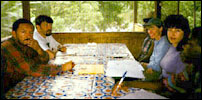Touring Light
The Ecotourism Society Sets the Standards
As more and more ecotourists hit the trail, tourism operators are recognizing the business-boosting benefits of calling themselves green. But what’s to prevent even the most eco-unfriendly entrepreneur from making such a claim? Not much so far. While some industry groups such as the World Travel and Tourism Council have their own in-house rating programs, there is no objective, independent system in place for monitoring green tour claims. And, there has even been disagreement between groups about how to do the ratings.

One organization trying to remedy this is The Ecotourism Society. An international non-profit group based in North Bennington, Vermont, the society was founded in 1991 to work toward making tourism “a viable tool for conservation and sustainable development.” By sponsoring international workshops, establishing a working network of ecotourism experts and organizations, and publishing books and guides for tourism planners and managers, the society is trying to tie together a scattered and disparate movement. It has also developed the only independent, internationally recognized guidelines for the nature tour industry.
Ecotouring isn’t for everyone. It might mean waiting all day for a shower, until the solar heater has time to do its work, or putting up with an occasional smell from the composting toilets. Nicole Otte, the society’s program director, admits, “Ecotourism is still very small; it’s a tiny niche of nature and adventure travel.”
While such groups as the Adventure Travel Society function like trade associations, providing tangible benefits and support for members, The Ecotourism Society is more of a think tank, working to push industry members to adopt green practices. According to Jamie Sweeting, ecotourism program manager of one member group, the Washington-based Conservation International, “Their true value lies in persuading key tour operators to go out and make a difference. As a group, they’re pure green and very concerned about maintaining their integrity, which at times has detracted from their ability to grow and spread the message.”
Evaluating Operators
Last year, the society joined with the Ecuadorean Ecotourism Association to launch a pilot project called Green Evaluation to monitor tour operators in Ecuador. Travelers were asked such questions as: Are tour operators advising against purchasing products made of materials from threatened plants or animal species? Did the operator hire locally owned businesses or contribute to local non-profit initiatives? Did the guide encourage proper disposal of waste products?
Data from these questionnaires were then analyzed by the Recreation, Travel and Tourism Institute at Clemson University in South Carolina. The hope is that, once refined, Green Evaluation can be used to monitor operators in other countries throughout the world.
Though the society’s executive director, Megan Epler Wood, feels that the consumer surveys are useful, she sees a natural progression into offering some kind of Good Housekeeping-style professional accreditation. While sending an inspector to every operation around the world isn’t realistic, Epler Wood says the society is considering professional spot checks. “This is an enormous process,” says Epler Wood. “Travel is a product of the mind more than anything else, so it’s difficult to certify. We know we need to develop a monitoring technique that is rock solid and independent.”
Living Labs
Meanwhile the society continues its projects in other areas-to date it has worked with ecotourism professionals in more than 70 countries. Ecuador is a perfect laboratory for the society, says Epler Wood, since a very high number of its communities-all with very high hopes for economic development-are trying to support tourism operations. Because it has such a wide range of ethnic groups as well as natural ecosystems, she adds, it is a “living laboratory” for ecotourism experts and local groups to learn from. Otte cites the Ecuadoran rainforest lodge Kapawi as a model, because it is 80 percent solar heated, provides its readers with complete information about the local flora and fauna, as well as the indigenous Indian population, used local construction materials, and in general follows environmental principles.
Just a few of the other projects the society has worked on over the years include tourist management in the environmentally delicate Galapagos and in Costa Rica, and sustainable planning and design of ecolodges in Kenya. In 1995, the society helped to establish CORAL, a non-profit group organized to gain support for coral reef conservation within the scuba diving community. In 1996, the society held the first of a planned series of workshops on marine ecotourism in Hawaii. Epler Wood says she intends to keep the focus on “influencing the direction of ecotourism worldwide.”
SHEILA POLSON is a freelance writer living in Maine.

